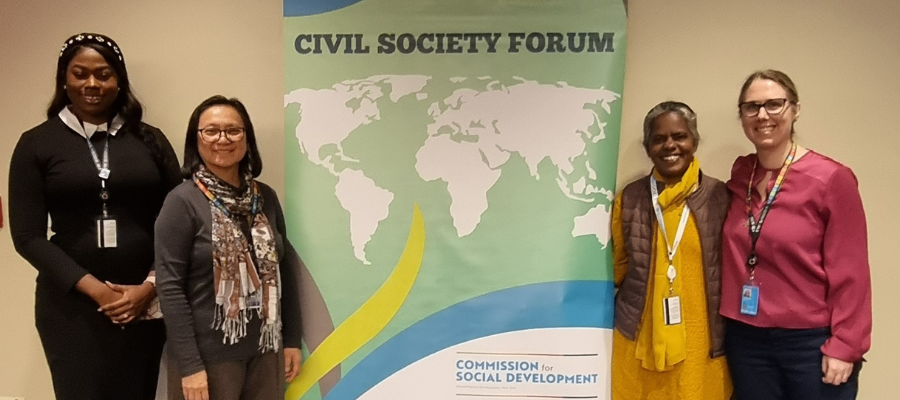
In February, I was privileged to attend the 62nd session of the UN Commission on Social Development which focused on the theme: Fostering social development and social justice through social policies to accelerate progress on the implementation of the 2030 Agenda for Sustainable Development and to achieve the overarching goal of poverty eradication. The event also commemorated the 30th anniversary of the International Year of the Family. I was grateful to attend plenary sessions and side events alongside Sr. Janet Palafox IBVM and Sr. Smitha Muthu CJ and to experience the Becoming One of the Institute through the UN Office.
It was important for me to attend CSocD in order to further the education and advocacy aims of the Mary Ward Centre with respect to the UN Sustainable Development Goals (SDGs) and in relation to our projects with youth, especially newcomer youth. In addition, the Mary Ward Centre sponsored the participation of a youth representative, Brantella Williams, to attend a portion of CSocD and to speak at a side event sponsored by the IBVM-Loreto NGO. Brantella, an advocate for education for newcomers, spoke about the importance of immigration status for newcomer youth and access to education, emphasizing the need for permanent resident status for all newcomers with precarious immigration status as a means for alleviating poverty. Brantella spoke passionately and authentically about the real need in Canada for better policies for immigrants, refugees, and migrants.
Brantella’s presentation echoed the messages of another side event I attended on Decommodifying People, Place, & Planet: Transformative Policies Towards Unconditional Inclusion and Belonging sponsored by several faith-based NGOs. The Irish Ambassador to the UN, Fergal Mythen, argued that the interlinked crises of poverty, homelessness, housing, and education don’t happen in a vacuum; rather, they are a result of policy decisions and human made actions. We need policies that decommodify people, place, and planet, and even more, these policies need to be put into action. What he said resonates with what newcomer youth in Canada have told us. They often feel that their immigration status is a commodity regulated by the Canadian government, rather than a human right. Newcomer youth in Canada who have a precarious immigration status have difficulty accessing basic services, even secondary education. Obtaining permanent resident status in Canada is a life changing opportunity for many of them.
During CSocD, Brantella and I had the opportunity to build our advocacy relationship with our ongoing Canadian SDG advocacy partners, representatives of the Sisters of St. Joseph of Toronto and the Canadian Federation of the Sisters of St. Joseph who were present. Together, we met with an official from the department of Employment and Social Development Canada to discuss further possibilities for youth engagement on the SDGs and federal advocacy initiatives. We are committed to working together to ensure that the voices of youth in Canada, regardless of immigration status, are heard by government officials and that their voices and views are heard and accounted for when policy decisions are made.
Author: Sarah Rudolph, ibvm, Canada
